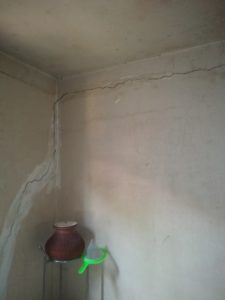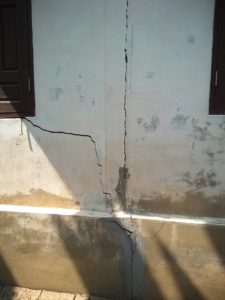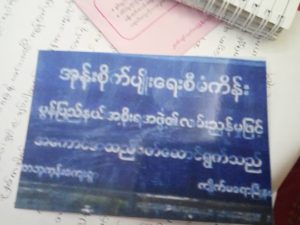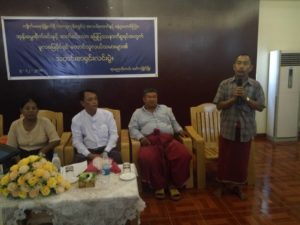Police corruption over drug charges and ongoing court delays land man in jail for 3 months in Ye Township
February 8, 2019
HURFOM: On November 4th 2018, Ah Soe, a 29-year-old man from Tha Byay Thit village, Ye Township, Mon State, was arrested by the Mon State Anti-Narcotic Task Force under the authority of Police Captain Kyaw San in Hnit Kayin village for possession of methamphetamine pills (yaba) purchased at the request of a friend. For nearly three months, Ah Soe has been remanded in Ye Police Station, as the Ye court cannot proceed with its investigation given that the plaintiff, Police Captain Kyaw San, has yet to appear before the court.
On the day of the incident, Ah Soe had travelled to Hnit Kayin village to repair his motorbike where he was approached by his friend, Nai K—, and provided 25,000 kyat (US $16.46) to purchase yaba in nearby Ah Nin village, at Nai K—‘s request. Read more
Mawlamyine Cement Limited continues to destroy land, property, and livelihoods for villagers in Kyaikmayaw Township
February 6, 2019
HURFOM: Residents of Ni Ton and Kwan Ngai, two riverside villages along the Attran river in Kyaikmayaw Township, Mon State, are fearful of remaining in their homes, as the powerful bow waves generated by vessels transporting coal and cement to and from the nearby Mawlamyine Cement Limited (MCL) power plant and factory are eroding the banks of the river and damaging the foundations of houses along this stretch of the Attran.
 According to residents, the scale of damage resulting from the daily transportation of goods has increased every year since MCL’s operations began.
According to residents, the scale of damage resulting from the daily transportation of goods has increased every year since MCL’s operations began.
“Cracks [in the foundation] have increased year after year. This year we’ve seen the greatest number of cracks. Since this factory has been in operation, we’ve been suffering. The factory has operated for just three years, and we’re [villagers] already afraid to live in our houses…We have to move. High-ranking government officials must take responsibility for this problem. We’ve voiced our concerns many times, but nothing has changed. If your house has been damaged, you have to repair it yourself. We have to repair our house every year,” said Daw San Maw, a resident of Kwan Ngai village.
A group of 15 villagers from both Ni Ton and Kwan Ngai shared similar stories, stating that the scale of damage to their homes has increased with each passing year, and added that the daily passage of vessels has led to environmental degradation.
The environmental impact of MCL’s operations has been wide ranging. Soil erosion, a marked decline in fish stocks along the Attran, and difficulties accessing clean water, fruits for traditional medicinal purposes, and natural construction materials have all been reported.
“The river can’t bear the momentum of the vessels. The riverbank collapsed and riverside houses have been damaged. It’s not easy for us to move and build a new house. In the past, we organized many activities to oppose the project, but nothing has changed. We’ve given up,” said villager Nai Ohm Pan Lay.
Although some residents may express defeat, opposition to MCL’s presence in the region has been sustained since at least 2015, when residents first learned that the factory would be coal-powered. In February 2017, more than 2,000 villagers from the Pyar Taung region of Kyaikmayaw Township demonstrated against MCL, calling for an end to the use of coal.
When speaking about the broader environmental impacts of the heavy river traffic, U Khin Maung, a fisherman from Kwan Ngai village, stated that the number of fish and prawns in the Attran had significantly decreased since MCL began operations.
“When the factory first opened, we still caught 30 peittha (48.9 kg) of fish and prawns per day, but now we have to fish all day to catch only 3 peittha (4.89 kg). There are practically no fish or prawns left. The future will be very difficult for us,” said U Khin Maung.
To make matters worse, fisherfolk report that the vessels hired by MCL routinely destroy their fishing nets, compounding the livelihood challenges posed by MCL’s operations.
 However, it is not just livelihoods that are under threat, for in September 2018 a fisherwoman died after being struck by a vessel transporting coal to MCL’s power plant.
However, it is not just livelihoods that are under threat, for in September 2018 a fisherwoman died after being struck by a vessel transporting coal to MCL’s power plant.
At the request of residents, a warning sign instructing vessel operators to reduce their speed was installed atop a bridge in Kwan Ngai village, though villagers report that MCL’s vessels continue to travel at worrying speeds.
Villagers have also approached MCL, asking them to ensure their vessels remain at least one mile apart from one another when in transit.
“At the very least, if the vessels reduce their speed the negative impacts will decline, and our suffering will ease,” said Nai War, a local resident.
Mawlamyine Cement Limited is a joint-venture between Siam Cement Group (SCG) and Pacific Link Cement Industries (PLCI). The company has repeatedly come under fire from locals, the monastic community, and members of parliament for the negative impact its operations continue to have on local livelihoods and the environment.
For more information on MCL and the impact of foreign direct investment in Mon State, please refer to HURFOM’s 2016 report Examining Foreign Direct Investment in Mon State, Burma.
Farmers in mixed-controlled areas of Ye Township shoulder financial burden of double taxation at the hands of the NMSP and KNU
February 1, 2019
HURFOM: For farmers in Par Ka Dike village, Ye Township, an area of disputed territory between the New Mon State Party (NMSP) and Karen National Union (KNU), land transfer taxes levied by both the NMSP and KNU place a considerable financial burden on those buying and selling farm land.
On January 6th 2019, farmland located in Par Ka Dike village was sold from one farmer to another. Shortly thereafter, on January 9th, both farmers received letters from the Mon National Liberation Army (MNLA) battalion stationed near Par Ka Dike village, instructing them to appear at the MNLA base. Read more
Father and son arbitrarily arrested, detained by unknown armed group not seen for 4 months, wife struggling to meet daily needs
January 30, 2019
HURFOM: A father and son working on a rubber plantation in Kaw Sein Ban village, Hpa-an Township, Karen State, were arbitrarily arrested and detained by an unknown armed group on October 8th 2018, and nearly four months after their arrest, the family of the two detainees has yet to receive any information about their whereabouts or well-being, according to Daw Mya Tway Mon, the wife and mother of the two victims. Read more
Donations sought to support construction of Mon National School in Mudon Township
January 29, 2019
HURFOM: With the backing of local residents, Buddhist Monk Baddanda Oak Ta Ra has appealed for donations to support the construction of a Mon National School in Pal Do village, Mudon Township, Mon State. At present, no such school exists in the village, and students seeking to pursue the Mon National School program in Pal Do are attending classes operating out of the local monastery, and the local community center. Read more
Drug treatment center providing medical care, psychotherapy, and vocational training set to open in Dawei District
January 25, 2019
HURFOM: A drug addiction treatment and rehabilitation center is set to open soon in Dawei District, near Wal Zin village, under the authority of the New Mon State Party (NMSP), and with the support of monks and locals hoping to stem the rising tide of substance abuse among the region’s youth. Read more
Farmers demand 1,000 acres of confiscated land be returned in Kyaikmayaw Township
January 24, 2019
HURFOM: On the heels of the 2010 general elections, farmers in Kyaikmayaw Township, Mon State, successfully reclaimed some of their former lands, all of which is located between Bar Bu Gone village and Kha Yone Gu hill, though on the land yet to be returned, the Mon State government has implemented a coconut farming project, a move that has been heavily criticized by those still waiting to have their lands released.
 The farmland, estimated to total approximately 1,500 acres, was seized by the State Law and Order Restoration Council (SLORC) shortly after the 1988 military coup that brought the SLORC to power. Under the SLORC, farmers paying an extortionary tax were permitted to continue farming the land, though by 1994 farmers had stopped working the land in response to ongoing arbitrary taxation, and unfavorable growing conditions.
The farmland, estimated to total approximately 1,500 acres, was seized by the State Law and Order Restoration Council (SLORC) shortly after the 1988 military coup that brought the SLORC to power. Under the SLORC, farmers paying an extortionary tax were permitted to continue farming the land, though by 1994 farmers had stopped working the land in response to ongoing arbitrary taxation, and unfavorable growing conditions.
Rather than return the remaining 1,000 acres of land, in full, to its rightful owners, between 2017 and 2018, the Mon State government used the land to implement a coconut farming project, according to Nai M—, a villager from Kaw Naut village track, Kyaikmayaw Township, who lost his 40-acre plot to the project.
After the 2010 general elections, local farmers appealed to the Mon State Parliament in a bid to reclaim their lands, and the Mon State government proceeded to return 500 acres to farmers, while retaining control over the remaining 1,000 acres.
“[The government] said they’ll give the land back, but they never handed over the land to us. When making inquiries about the land, some government departments replied that the military and the government department didn’t need the land anymore. Even though they didn’t need the land, they didn’t give back the land to us. Now, the coconut farming project has been implemented under the instruction of the Mon State government,” said Nai M—.
On December 5th 2018, some 50 local farmers organized a press conference at the Rehmonnya Hotel in Mawlamyine to voice their grievances over the coconut farming project and the continued seizure of their lands.
On January 10th 2019, Mon State Chief Minister Dr. Aye Zan, and U Tun Htay, Mon State’s Minister of Agriculture, Livestock, Transportation and Communication, visited the area to determine whether conditions would allow for the implementation of a sugar cane growing project, and a second coconut growing project, in the coming raining season.
 “The farmland is ours, but I wasn’t invited to farm green coconut. The minister just discussed [the project] with only four farmers [from Kaw Naut village] who hold Form No. 7 (Land Use Certificate)…But all of the farmland isn’t just located in Kaw Naut. There is also farmland from Kaw Tat and Kaw Swel. All the farmland in all three villages has been confiscated,” said Mi H—, a Kaw Tat resident who lost her 60-acre plot.
“The farmland is ours, but I wasn’t invited to farm green coconut. The minister just discussed [the project] with only four farmers [from Kaw Naut village] who hold Form No. 7 (Land Use Certificate)…But all of the farmland isn’t just located in Kaw Naut. There is also farmland from Kaw Tat and Kaw Swel. All the farmland in all three villages has been confiscated,” said Mi H—, a Kaw Tat resident who lost her 60-acre plot.
During President U Win Myint’s visit to Mon State in December 2018, 29 local farmers filed a report to the President.
“Our demand is that the farmland confiscated by the military, the armed groups, and the government departments under the name of [development] projects, be returned to the original owners. We want the farmland…We don’t want any substitute. [The government] must grant Form No. 7 to those farmers who don’t have the documents yet. We’ve also demanded a stop the ongoing coconut farming project,” said Mi H—.
On November 28th 2018, the Mon State Chief Minister Dr. Aye Zan claimed that the farmland included in the coconut growing project area belongs to the Township General Administration Department (GAD), and that the Mon State government has leased the farmland at 20,000 kyat (US $13.07) per acre from the GAD.
More than 30 years after their land was seized by Burma’s former military junta, and despite government guarantees in the months following the 2010 general elections, farmers in Kyaikmayaw Township have yet to have their lands returned to them. As for the Mon State government, who have limited autonomy over the agriculture industry, which is managed at the Union level, it is all too easy to deflect any responsibility for these matters through mention of the GAD.
Added to this, and as past research conducted by HURFOM has shown, inaction on the part of land investigation committees established to resolve such cases, alongside an acute lack of transparency within government, provides no clear structure denoting to which authorities or government bodies victims should appeal regarding their land disputes, leaving farmers in Kyaikmayaw, and elsewhere, with little recourse to justice.
Fears of land confiscation grow as military marking-stones discovered on farmland
January 23, 2019
HURFOM: Residents of Wae Kalee village, Thanbyuzayat Township, have growing concerns about land confiscation upon discovering land-marking stones demarcating some 500 acres of local farmland, believed to be laid by forces training at the nearby Advanced Military Training School No. 4, according to reports. Read more
2,000 in need of humanitarian assistance on Kalagoke Island in aftermath of cyclone Pabuk
January 21, 2019
HURFOM: Nearly 2,000 people are in need of humanitarian assistance, while schools, monasteries, and some 400 houses sustained damage after tropical cyclone Pabuk swept across Kalagoke Island, Ye Township, Mon State, at approximately 8 am, on January 8th 2018.
According to Kalagoke Administrator U Taung Sein, Pabuk was only the second tropical cyclone to hit the island in recent memory. In all, 396 houses, two schools, and two monasteries were damaged. Read more
13-year-old boy accused of rape, murder, and allegedly tortured by police, released on bail
January 17, 2019
WCRP: A 13-year-old boy taken into police custody in early November 2018, on suspicion of the rape and murder of his adoptive sister, was released on bail by the Zayar Thiri Police Station on November 20th 2018, as authorities could not amount any evidence to keep the boy in police custody or press charges under Article 376/302 (punishment for rape/punishment for murder) of the Penal Code.
Police suspected the boy of raping and killing his 8-year-old adoptive sister on October 18th 2018, in the Tar Yar Aye Quarter of Mawlamyine, Mon State. Although the boy’s neighbors informed the police, and could attest that, he had been playing with his friends in the village while the victim went missing, he was held at a Youth Care Training Center, under the control of the Ministry of Social Welfare, Relief, and Resettlement from November 2nd 2018, until his release. Read more



















































